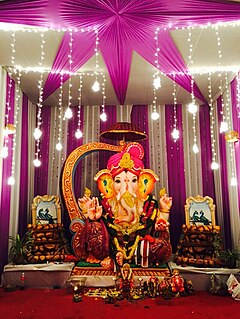Ganesh festival
| Ganesh Chaturthi | |
|---|---|

Ganesha Festival, Hyderabad
|
|
| Official name | Ganesha Chaturthi/Vinayaka Chaturthi |
| Also called | Chavath ,Chavathi, varasiddhi vinayaka vratam,pillayar chaturthi,lambodara pirnalu, Ganeshotsav |
| Observed by | Hindus |
| Type | Religious |
| Celebrations | chanting of Vedic hymns and Hindu texts, prayers, martial arts, last day: processions, idol immersion |
| Begins | Bhadrapada shukla chaturthi |
| Ends | 10 day after start |
| Date | Bhadrapada (August–September) |
| 2017 date | Friday, 25 August |
| 2018 date | Thursday, 13 September |
| Frequency | Annual |
Ganesh Chaturthi (IAST: Gaṇēśa Chaturthī), also known as Vinayaka Chaturthi (Vināyaka Chaturthī), is the Hindu festival that reveres god Ganesha. A ten day festival, it starts on the fourth day of Hindu luni-solar calendar month Bhadrapada, which typically falls in Gregorian months of August or September. The festival is marked with installation of Ganesha clay idols privately in homes, or publicly on elaborate pandals (temporary stage). Observations include chanting of Vedic hymns and Hindu texts such as Ganapati Upanishad, prayers and vrata (fasting). Offerings and prasada from the daily prayers, that is distributed from the pandal to the community, include sweets such as modaka believed to be a favorite of the elephant-headed deity. The festival ends on the tenth day after start, wherein the idol is carried in a public procession with music and group chanting, then immersed in nearby water body such as a river or ocean, thereafter the clay idol dissolves and Ganesha is believed to return to Mount Kailasha to Parvati and Shiva.
The festival remembers Ganesha's birthday, and celebrates him as the god of good beginnings, prosperity and obstacle remover. It is observed throughout India, especially as a public event in the western states of India such as Maharashtra, Gujarat and Chhattisgarh, usually as a private home festival in other states such as Tamil Nadu, Telangana, Andhra Pradesh and Madhya Pradesh where it overlaps with the Teej festival. At public venues, along with the reading of texts and group feasting, athletic and martial arts competitions are held. It is unclear when the festival started, it may have South Indian origins, but historical evidence suggests it became a major social and public event with sponsorship of Shivaji after Muslim-Hindu (Mughal-Maratha) wars, and again in the 19th century after public appeal by Indian freedom fighter Lokmanya Tilak, who championed it as a means to circumvent the colonial British government ban on Hindu gatherings through its anti-public assembly legislation in 1892.
...
Wikipedia
